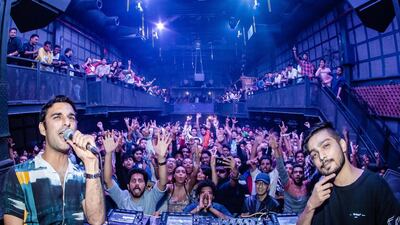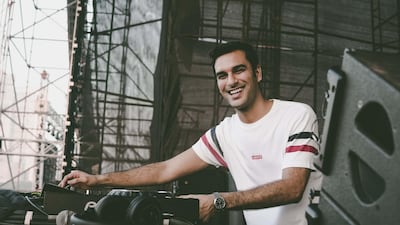It's a rare Friday in Kolkata as Anish Sood, one of India's most prominent young DJs, gets behind the console, returning to the city for the first time in nearly four years. The crowd go wild as soon as they spot him in a corner, waiting for the opening set to wrap up.
Sood is relaxed and enjoying the vibe as more and more people pour into the lounge and ask for pictures with him. High on pulsing energy, he kicks off his set and rounds up the night dancing away, flushed with excitement. It wasn't Sood's first jam-packed rodeo, and it certainly won't be the last, as young Indians take to electronic dance music, particularly techno, with renewed fervour. On Friday, December 27, Sood will be setting the Sunburn Festival stage in Goa on fire. He also has an album in the works, with the first track due out by February.
At 30, Sood is among the brightest young DJs and music producers in the country, although his win last year at the Independent Music Awards – the first for an Indian – puts him a notch above the rest. Starry Night, which bagged the Best Electronica / Dance Single award, is a fun, groovy track with a definite feel-good vibe, reminiscent of Marvin Gaye. "Starry Night does remain a favourite," he beams.
Musically, however, Sood's sound has changed dramatically over the past year. While he's more of a classic house, EDM and progressive house kind of guy, one of his latest projects, Sin City – a club-based concept that he started this summer, where guests are invited to a musical experience based on a theme – experiments heavily with deep techno. "Around 2017, I was wondering if I should stick to traditional pop, or go back to my house roots," says Sood. "People loved my tracks, but after a point I couldn't play at clubs and festivals, I just wasn't enjoying it. I started turning down shows, at which point I realised I had to make a choice."
Sood, who grew up in Goa, has always had a strong musical bent. His father and uncle are both guitarists, so he was always around music. He hated guitar classes, though, much preferring the piano, and got hooked on electronica at 15, thanks to A State of Trance by Armin van Buuren. "I started to collect music – cassettes – and then when my father got me a CD writer, I began to download tracks and build a repertoire," he says.
While studying mechanical engineering in Goa, Sood began to throw parties in hostel rooms, which is where his DJing career kicked off. He also started booking DJs for parties and going over to clubs where he began playing as well. Soon he was doing shows across Goa, albeit constantly fending for himself: "If I was in Mumbai or Pune, I could have joined a school, but Goa didn't have that ecosystem," he says. In fact, Sood was balancing his family business with music until three years ago, when he turned full-time musician and producer.
And he has come a significant way since he burst on to India's electronic music scene in 2012, when the genre exploded globally. He started working closely with promoter Submerge's Nikhil Chinappa, then went on to play at Indian festivals such as Sunburn and NH7 Weekender, and played shows with big-name DJs including David Guetta, Tiesto, Afrojack and Steve Aoki, picking up important tips from these stalwarts.
"The art of DJing is to pick a track to follow something you're already playing and hold people's attention," says Sood. "The skill lies in retaining crowds. Today, it is acknowledged as an art form. Also, if you play tracks people already know, they'll dance, of course, but big DJs always play unreleased music. That's their USP."
But what kind of DJ is he? "Artists can be inflexible, but if you go out and play something and no one is dancing, you're failing. I never plan my sets, I play on the floor, reading the crowd and what it wants. I play what people will enjoy because at the end I'm an entertainer."
From glam pop to deep house – sprinkled generously with disco and funk – considering the genres he's traversed, Sood retains his core fan base. Before the show in Kolkata, fans in the city wrote to him expressing their excitement at having him back for a gig after four years. "In some cases, I'd see that they listen to the same music I do, so not only has my music evolved, but so have my fans' tastes," he says. "So, they continue to follow me because our music sensibilities have grown similarly." To supplement his growth, Sood began to produce and release his music via his label Class Action, too, all of which has contributed to his popularity globally.
A lot of his current popularity is because the electronic music scene in India is in a new phase. "While the scene has shrunk, this is because only serious music lovers come to gigs now," he says. "And even though India has a serious lack of good venues, more and more artists from around the world are making appearances here to packed houses."
Now, apart from doing Sin City, and his coming Sunburn gig and new album, Sood's label is poised to release records by emerging artists from next month – he has signed five from around the country so far. But his proudest moment? "I couldn't say," he says with a smile, clearly uncomfortable about blowing his own trumpet. "I don't dwell on the past. I'm all about what's next."



